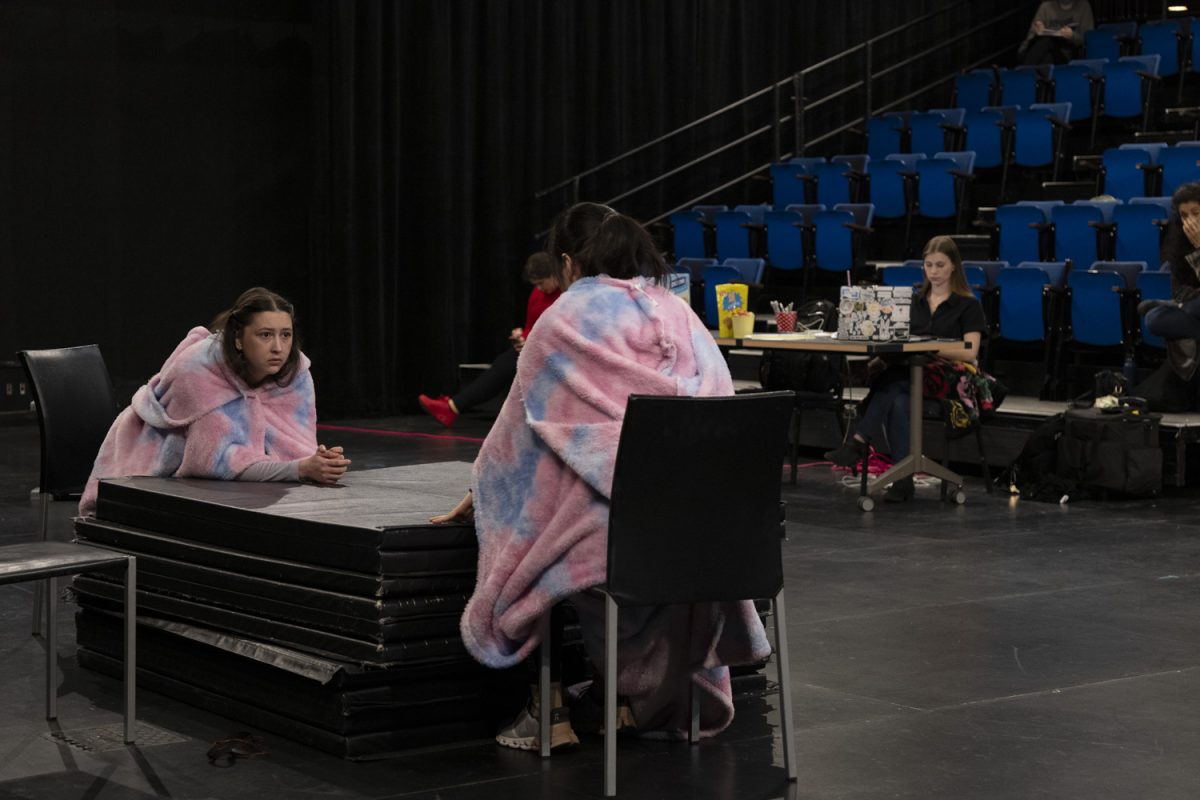It is not uncommon to have strangers knocking on your door around the holidays, pleading for donations, singing carols, or preaching a gospel. It is rather unusual, however, for a solicitor to be wrapped in LED lights, singing a fast-paced sales pitch, and claiming light can cure holiday depression.
A scene like this only makes sense onstage in a musical, specifically the comedic musical Striking 12.
When a chirping saleswoman knocks on the door of a character known only as the Man Who’s Had Enough, he unsurprisingly shuts the door in her face — not realizing he could do with a few mood-lifting LED lights.
At 8 p.m. Friday in Theater Building’s Mabie Theater, the University of Iowa Theater Department will open its interpretation Striking 12, the first Mainstage Production of the season.
The show tells the story of the Man Who’s Had Enough and his dread of the holiday season. But when an unexpected visitor arrives, the Man is introduced to Hans Christian Andersen’s classic “The Little Match Girl” and is enlightened about the true reason of the season.
UI junior Niki-Charisse Franco, who plays the Little Match Girl, said she enjoyed getting to play such a meaningful character.
“She is a representation of a group of people we often forget about during the holiday season: those who have no home to go to and are out in the cold during this time of year,” she said.
Along with shifting back and forth between the Man and the story of the Little Match Girl, the actors also switch in and out of character, interacting with the audience. The Striking 12’s script — which consists of songs and very little dialogue — allowed the UI cast and crew to incorporate original material in the musical, first produced Off-Broadway in 2006, written by Brendan Milburn, Rachel Sheinkin, and Valerie Vigoda, at the Daryl Roth Theater in New York City.
Director John Cameron said Striking 12’s nontraditional structure drew him to the musical originally, even if it presented difficulties along the way.
“The script has never been staged as extensively as this, and there isn’t a lot of book with the music, so many of the scenes and pictures on stage are being done for the first time,” he said. “It was challenging to come up with so much original material.”
Beyond improvisation, Franco said it took practice to adapt to the musical format, especially for a show with serious themes under its funny surface.
“There are so many more levels to it,” she said. “One strategy I learned, thanks to our director, was to recite the songs as a monologue. You begin to actually hear what you’re singing and not just reciting it from memory. You find the importance of certain lyrics and the different dynamics of a song.”
The show is set to a soundtrack of holiday music, ranging from satirical to moving. Music director Carl Rowles said Striking 12 not only breaks the mold of holiday productions but musicals in general.
“A lot of musicals try to smack you between the eyes with big production numbers, fancy choreography, and over-the-top performances. This show does none of that,” he said. “Striking 12 is heartfelt, genuine, and has a wide variety of musical styles. It’s really something that everyone can enjoy, even if you aren’t that big into music or theater.”
Rowles was in charge of making artistic decisions with the music of the show, such as phrasing, tempo, and pacing. However, Rowles’ function during the course of the performances will depart from the usual, and that has been one of his biggest trials.
“This is a unique situation in that I will not direct any of the performances of the show,” he said. “I usually conduct, or I will play and conduct from the keyboard. I’ve also set it up so there isn’t a standing conductor for the band; it will all be directed by the musicians themselves. Getting them comfortable with the music to the point where they can lead themselves through the show has been challenging.”
Despite these obstacles, actors such as Franco appreciated the chance to have freedom of creativity.
“We were allowed to play around a lot with this script, and we made it our own,” she said. “There are moments in the show where we break character, make things our own, and bring what we can to the stage, all while keeping the message and the content of the show intact.”
Participating in Striking 12 allowed her to develop as an actor and a singer, she said, while also leading to personal growth, shaping her perspective on the downtrodden.
“I’ve learned to look past my own problems and see that there are people in the world who need help, especially during the winter,” Franco said.
UI freshman Sydney Alexander, who plays the ex-fiancée of the Man Who’s Had Enough, said the truthfulness of Striking 12 makes it greater than the average musical.
“You probably haven’t seen a show quite like this one before,” she said. “You will laugh till your sides hurt, cry your eyes out, and will be officially in the holiday spirit after only an hour and 15 minutes.”
THEATER
UI Mainstage Series, Striking 12






